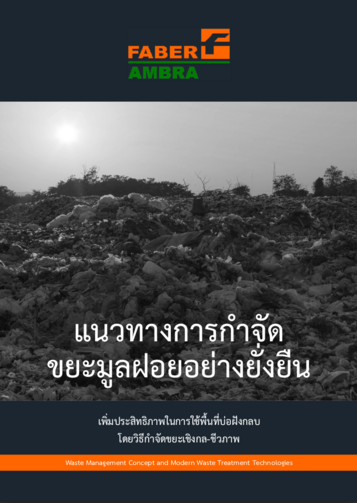Faber Technologies Co. Ltd., a company based in Trang, Thailand, specializes in waste treatment utilizing the innovative MBT (Mechanical Biological Treatment) Method. The company is well-known for its strong commitment to sustainable waste management solutions and environmentally conscious practices.
Within an MBT framework, waste processing unfolds in distinct stages. Initially, incoming waste undergoes mechanical sorting to extract recyclable materials such as metals, plastics, and paper. Subsequently, the residual waste proceeds through biological treatment, encompassing composting or aerobic digestion methods.
Composting engenders the decomposition of organic waste by microorganisms in an oxygen-rich environment, yielding compost—a nutrient-dense soil enhancer. Conversely, aerobic digestion employs microorganisms in the presence of oxygen to decompose organic substances into simpler compounds.
Through the amalgamation of mechanical sorting and biological treatment, MBT systems efficiently curtail landfill-bound waste volumes, salvage valuable resources, and generate compost for agricultural or landscaping applications. This holistic approach epitomizes Faber Technologies Co., Ltd's unwavering dedication to sustainable waste management practices.
Waste management in Thailand often relies on landfilling as the primary method, which comes with various challenges such as the difficulty in finding space for landfills and resistance from communities in chosen landfill areas. Additionally, there are issues related to foul odors and leachate in landfills, which is inadequate for proper treatment, leading to high costs for leachate treatment from waste landfilling. To address these challenges, a new approach popular in many European countries like Germany, Austria, Italy, and France is Mechanical Biological Treatment (MBT) for waste management. The objective of MBT is to treat waste and reduce environmental impacts from landfilling while producing Refuse Derived Fuel (RDF).
The use of MBT technology in waste management offers significant advantages as it can reduce landfilling issues, minimize environmental problems, and also facilitate recycling of waste. Introducing this technology in waste management in Thailand is considered a good alternative for effectively reducing waste problems and adding value to waste simultaneously.
Waste management using mechanical-biological waste treatment according to the FABER AMBRA® process involves the following main steps:
- Mechanical Separation and Shredding Treatment: Mixed waste will be separated, with larger items reclaimed for reuse. Hazardous waste will be shredded and mixed to facilitate the decomposition process.
- Biological Treatment: Waste that has been separated and shredded will be composted and aerated to enhance air circulation, allowing microorganisms to efficiently decompose the waste.
- Recycling and Utilization of Waste: After treatment, the separated waste will be used as RDF or compost.
This process is effective in waste management, reducing environmental issues, utilizing renewable energy, and being a sustainable system.
The advantages of MBT:
- Reduce landfill problems: MBT efficiently reduces the amount of waste that needs to be landfilled by treating the waste before disposal, helping to reduce the use of land for waste disposal sites and minimizing pollution in landfill areas.
- Reduce environmental impact: MBT helps to decrease the release of greenhouse gases and toxins from waste disposal.
- Material recycling: MBT aids in separating materials for recycling, decreasing the amount of waste sent to landfills and adding value to waste.
- Energy production: After MBT treatment, the waste can be used as a substitute energy source.
- Health risk reduction: MBT helps reduce health risks for people living near waste disposal sites.
- Material separation: MBT assists in separating materials that can be recycled, reducing the need for new materials and minimizing damage to natural resources.
In summary, MBT proves to be a beneficial technology for waste management by mitigating environmental issues, generating added value from waste, lowering public health risks, and even fostering the production of alternative energy.

